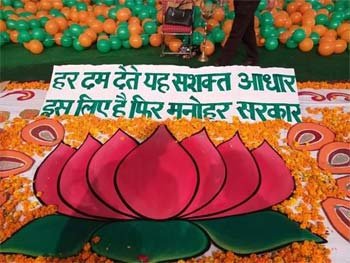The WTO since its very inception has had an inherent bias against the interests of poor nations vis-a-vis the rich. The least developed and developing countries like India are home to millions of poor, whose interests are set aside in each and every WTO ministerial meeting, by front loading the agenda of the US and EU.
That narrative is set to repeat itself at the Bali ministerial conference where the entire focus is on pushing the Trade Facilitation Agreement (TFA) which helps exporting countries at the cost of domestic industries. As a trade off, countires like India are offered a ‘peace clause’, which has a shelf life of just 4 years.
The peace clause offers protection against domestic support measures like Minimum Support Price (MSP) for agricultural produce being challenged before the dispute settlement body of WTO. Thus, it provides space for developing nations to procure produce for public stock holding and distribution to the poor, even though the total subsidy involved exceeds the 10 per cent cap set by WTO (subsidy should not exceed 10 per cent of the value of the total produce). In the Indian context, this helps us in implementing the National Food Security Act (NFSA).
The peace clause has primarily two loopholes. First, para 3 of the draft says  that any developing nation with a public stockholding programme shall ensure that stocks procured under such a programme do not distort trade. Secondly, an agreement on Subsidies and Counter veiling Measures (SCM) says that the income or price supports provided by WTO member governments should not cause adverse effects (article 1.2 & article 5). The adverse effects include “serious prejudices to the interests of other members (article 5c)”.
that any developing nation with a public stockholding programme shall ensure that stocks procured under such a programme do not distort trade. Secondly, an agreement on Subsidies and Counter veiling Measures (SCM) says that the income or price supports provided by WTO member governments should not cause adverse effects (article 1.2 & article 5). The adverse effects include “serious prejudices to the interests of other members (article 5c)”.
In a nutshell, the current darft of the peace clause is conditional and thus, offers no peace. When a member country is challenged, the burden of proof is on the challenged country. With the application of the peace clause, the areas which will be affected significantly include: a) MSP offered to small and marginal farmers, b) the food subsidy programme run by the Government of India.
Regarding the 10 per cent subsidy cap, the calculation is on the basis of the highly outdated reference price of 1986-88. Further, the calculation is done on the entire output rather than the actual area which is receiving the subsidy. Experts say that this subsidy cap was breached long ago, at least in terms of paddy, for which it currently stands at 26 per cent.
Annexure 2 of the Agreement on Agriculture refers to Green Box subsidies which are regarded as non-trade distorting and therefore permissible under WTO rules. The domestic food security and farmer support measures of the developing countries are not included in the Green Box, despite the fact that they are not trade distorting. Meanwhile, the US and EU have classified 90 and 80 per cent of their domestic agriculture support measures, involving direct payments to farmers, as Green Box subsidies. These provisions directly benefit large corporations. India and G33 are naturally negotiating to do away with the mountains of subsidies paid out by developed nations under the Green Box escape clause. An UNCTAD study shows that Green Box subsidies are in fact trade distorting. Any cut in these subsidies will affect both production and export potential.
G33 is further negotiating to eliminate imbalances in the WTO Agreement on Agriculture. The demands include updating the 1986 reference price and inclusion of Green Box subsidies. Not surprisingly, these proposals are opposed by developed countries. In a show of magnanimity, they have offered the caveat-ridden peace clause.
The TFA will increase our public expenditure to create infrastructure for the comfort of importers. This will adversely affect domestic industry.
At the Bali ministerial, India must lead the alliance of developing nations to challenge the entire focus of the meeting and bring about a balanced approach to the negotiating process. We have a sterling example of a hard negotiator in the late Murasoli Maran, then Minister for Commerce and Industry in NDA government. The effort should be a conclusion of the Doha development agreement.
Any hint of submission to a piecemeal solution will have adverse implications for our economic sovereignty, the livelihood of millions of our poor and small and marginal farmers.
*************************
 * *Muralidhar Rao
* *Muralidhar Rao
(Muralidhar Rao is BJP National General Secretary.)
————————————————————————————————–
*Disclaimer: The views expressed by the author in this feature are entirely his own and do not necessarily reflect the views of INVC.

















